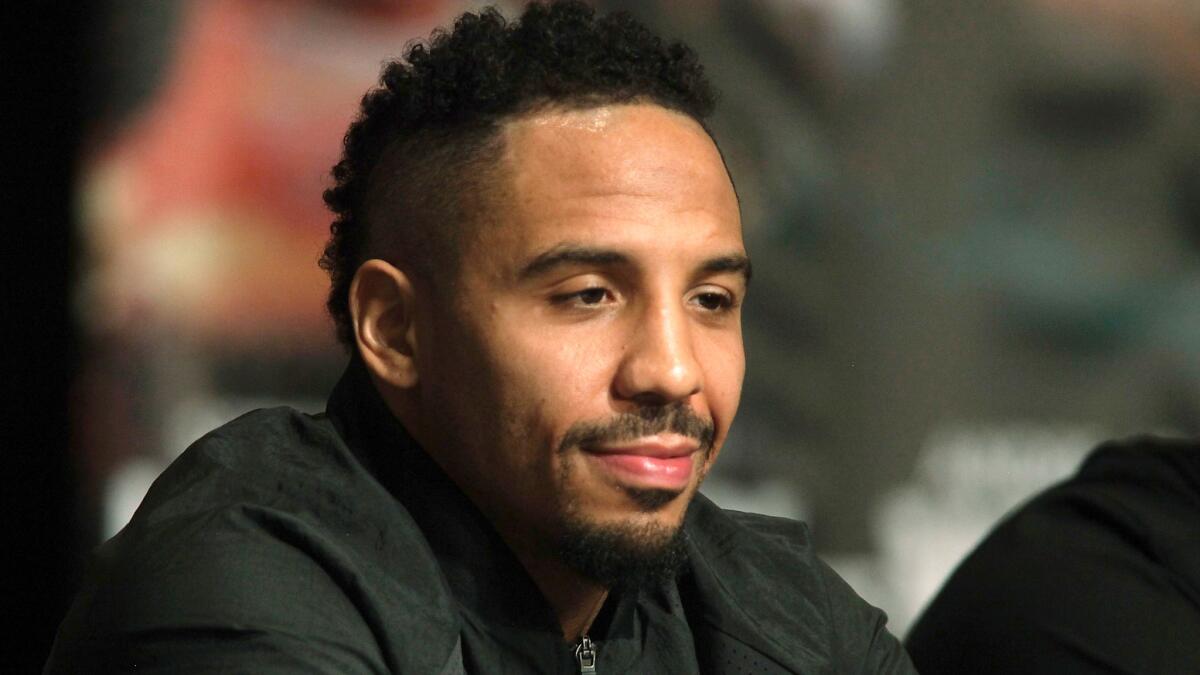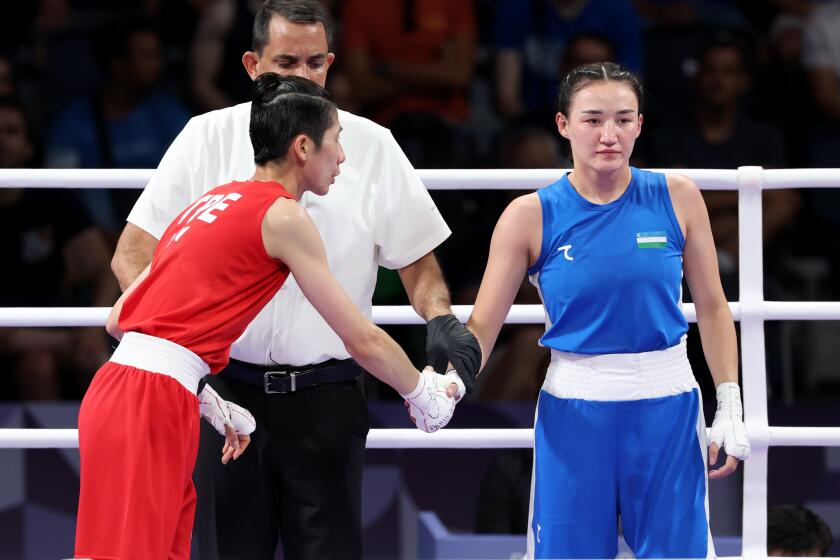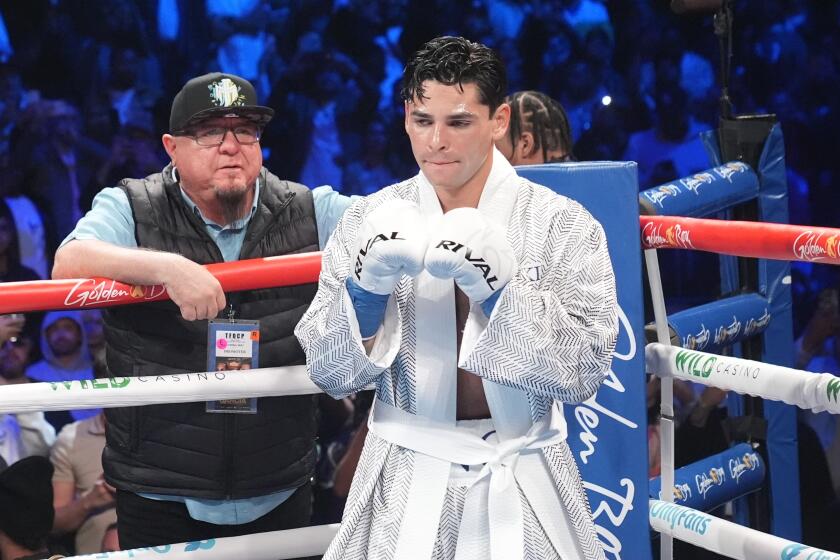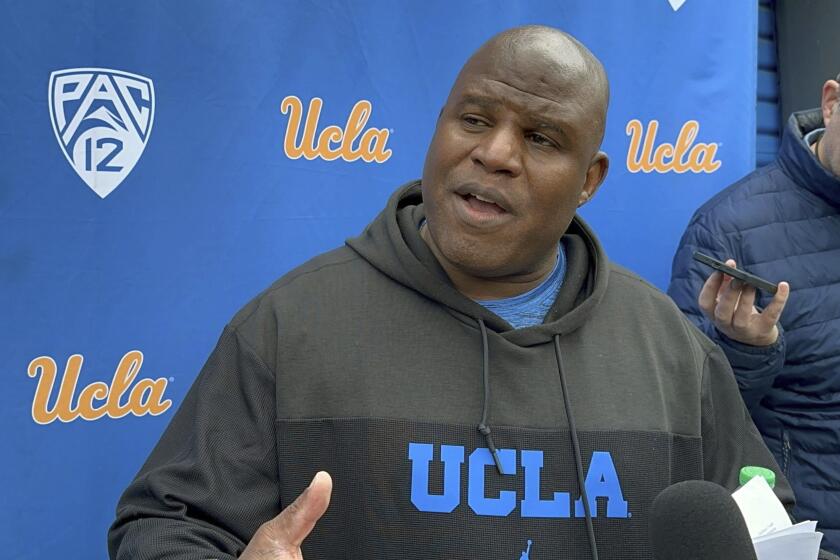Column: Andre Ward reflects on his struggle to become a popular champion

Andre Ward has an African American mother. He looks African American and he knows society views him as African American.
As he wondered aloud about why this should influence his boxing career and shared his disappointment over what fighters of his background have to do to receive mainstream recognition, he was pitched an idea.
Did he ever consider marketing himself as Irish American?
The former super-middleweight champion threw his head back and laughed.
“I thought about it,” Ward said.
His late father was white.
“I do have Irish in me,” Ward said.
If he looked Irish, he wouldn’t have taken this long to headline a pay-per-view telecast, something Ward will do for the first time Saturday when he takes on light-heavyweight champion Sergey Kovalev at the T-Mobile Arena. If Ward isn’t the best fighter in the world, his complete domination of the 168-pound weight class certainly makes him the most accomplished.
The reality that the ethnicity of a fighter influences his popularity is about as old as boxing itself. White fighters have traditionally enjoyed greater acclaim than non-white fighters of similar abilities.
A greater share of the sport’s viewership has become Latino over the last couple of decades, resulting in more opportunities for Latino fighters, particularly Mexicans and Mexican Americans. The flip side of that is that African American fighters such as Ward are finding it harder to develop large followings.
“Promoters will tell you that African American boxers are hard to promote,” said Virgil Hunter, Ward’s trainer and former guardian.
They won’t tell you on the record. Multiple boxing and television executives who were contacted refused to acknowledge the role of race in marketing.
But none of this is a secret. The most popular active fighter is super-welterweight Canelo Alvarez, a hard-punching but limited boxer who has taken Oscar De La Hoya’s place as the king of the Mexican and Mexican American box office. Middleweight champion Gennady Golovkin is from Kazakhstan but likes to say he has a “Mexican style” in what is a clear attempt to court the Latino fan base.
“If you look at Canelo, he’s got all these Hispanics following him,” Hunter said. “His people follow him. African Americans don’t support their fighters. They don’t support their own.”
The change in viewership has also resulted in a transformation of sensibilities. The counterpunching style often associated with African American fighters is no longer appreciated, so much so that Ward is often described as boring.
“My thing is that if you love the sport, appreciate the sport as a whole,” Ward said. “If you love the sport, you love the slick boxer, you love the guy who can box and punch, you love the brawler. Like me, I’ve been blessed with certain skill sets [so] don’t mock anybody who has to take two punches to get one.”
Ward, 32, said he would like boxing to be more like mixed-martial arts, where fans appreciate a wider range of styles.
Something else that hurt him was the devaluation of Olympic boxing. Ward was a gold medalist in 2004, but the sport was no longer televised in prime time by then. Ward never had a chance to establish himself as a national hero as Sugar Ray Leonard and countless others did before him.
Alongside Mike Tyson, Leonard was the signature fighter of the 1980s. However, when Hunter was asked if Leonard would be a superstar in today’s environment, he replied, “It’s very tough.”
A non-Latino fighter’s most likely road to stardom today is through Latino fighters. Floyd Mayweather Jr. became a household name by defeating Oscar De La Hoya, and Manny Pacquiao did so by taking on the likes of Marco Antonio Barrera, Erik Morales and Juan Manuel Marquez. This explains why Ward once pursued a fight with Julio Cesar Chavez Jr., a mediocre fighter who used his father’s name to become one of the sport’s top ticket sellers.
Mayweather did more than find the right opponent in De La Hoya. He used the platform to re-brand himself as a trash talker who boasted about his earnings.
“He became the villain,” Ward said. “My question is ,why does every African American fighter have to be the villain?”
Mayweather’s box-office success inspired his one-time protégé, Adrien Broner, to develop an even more vulgar public persona. Broner was undisciplined and never learned how to fight moving backward, resulting in a couple of career-derailing losses. If not for that, Hunter is convinced he would have become a major star.
But Ward has no intention of doing any of that.
“We’re not going to play that buffoon role,” Hunter said. “The main thing is to keep your head up, keep your dignity and make sure you are who you are.”
For Ward, that means remaining a Christian and a family man.
“I’m just being me,” Ward said. “If I’m not enough, I don’t know what to tell you. I’m not going to apologize about it.”
He acknowledged there was a time when this bothered him.
“I don’t get angry about it anymore,” he said. “I don’t get bitter about it. I understand it. I know where it comes from. It’s unfortunate, but life goes on.”
Ward said he takes comfort in knowing Roy Jones Jr. was subjected to similar criticisms and slights when he was considered the pound-for-pound No. 1 fighter in the late 1990s and early 2000s.
Ward said his priority is to be great, not famous. That’s the right mind-set for him to have, as even a victory over Kovalev on Saturday is unlikely to bring him widespread approval.
Twitter: @dylanohernandez
More to Read
Go beyond the scoreboard
Get the latest on L.A.'s teams in the daily Sports Report newsletter.
You may occasionally receive promotional content from the Los Angeles Times.











